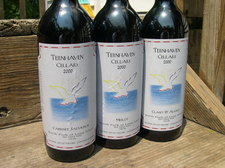(This story appeared originally in the 07/01/05 issue of Dan’s Papers)
 Ivy League Professor-Cum-Winemaker Harold Watts’ Approach: Small Production, Big Wines
Ivy League Professor-Cum-Winemaker Harold Watts’ Approach: Small Production, Big Wines
Garagiste, translated from the French, means “garage owner,” not
something usually associated with wine country. But it’s a term often
used in regions like Bordeaux to describe a winemaker who produces
small lots of high-quality, handcrafted wines – sometimes right in his
or her own garage.
Harold Watts, Ternhaven Cellars’ owner and winemaker, also started out
at home, but instead of making wine in his garage, Watts made wine in
his Manhattan apartment. Today, with an unintentional though amusing
nod to the European description, Watts literally is a garagiste: his
winery and tasting room are in a renovated service station, a former
garage, on Front Street in Greenport.
In 1994, Watts, a retired economics professor who taught at Yale and
Columbia Universities, bought five acres of land on Alvah’s Lane in
Cutchogue. He initially leased the land a local potato farmer but
eventually planted merlot, cabernet sauvignon and cabernet franc grapes
himself. In 1997, Ternhaven Cellars was born when Watts’ tasting room
opened.
When asked about the origins of his winery’s name, Watts replied with a
chuckle. “I enjoy watching terns at work catching fish here on the East
End. I know they nest around here, and the name sounds sort of warm and
fuzzy and maybe a bit ‘green.’ So I just grabbed it out of the air and
it ‘terned’ out to be registerable.”
While his winery and production levels are small, fewer than 1000 cases
per year, Watts’ wines are not. Last summer, at the New York Wine &
Food Classic, he won a double gold for his 2000 Merlot, a silver for
his 2000 Claret D’Alvah and a second silver for his 2000 Cabernet
Sauvignon.
Watts makes his wine in traditional Bordeaux style, doing primary
fermentation in shallow open tanks, basket pressing to closed steel for
secondary fermentation, racking off gross lees to barrels at or near
the end of ML (malolactic) fermentation. He doesn’t filter or cold
stabilize his wines. Despite his nod to Bordeaux, Watts uses mostly
American oak of varying age because the barrels are more affordable and
because “the difference for reds is marginal. And (using French Oak is)
not always for the best in my limited experience.”
The Ternhaven Cellars 2000 Merlot ($15) is a medium, uniformly crimson
wine with plumy, meaty aromas with hints of vanilla, oak and both
savory and sweet spice. On the palate, I found it to be medium-to-full
bodied with medium, slightly astringent tannins right out of the
bottle. With time to breath, the tannins smoothed out, resulting in a
full-flavored though not overly complex wine. The pleasant finish is
highlighted by sweet fruit and oak flavors. Watts recommends this wine
with Coq au Vin or a really good hamburger.
If you prefer juicier, berry-driven wines with less obvious oak
influence, the Ternhaven Cellars 2000 Cabernet Sauvignon ($18) is the
choice here. Nicely extracted with a deep ruby color, it’s extremely
aromatic. It filled my nose with raspberry and blueberry aromas long
before my nose even reached the glass. The palate is full-flavored and
juicy with raspberry preserves dominating. The oak and tannins are a
bit more integrated and the finish offers sweet oak and cedar. The
perfect match? “The Cabernet is great with ripe gorgonzola,” said Watts.
Of the three wines I tasted, I liked the Ternhaven Cellars 2000 Claret
D’Alvah ($19) the best. A blend of Merlot, Cabernet Sauvignon and
Cabernet Franc, it’s a deep, semi-opaque crimson in the glass with a
thin, slightly lighter rim. The nose is filled with black plums,
blackberries and black cherries with cedar, cocoa and faint green olive
aromas. This is a hefty wine with dusty, softly gripping tannins that
give it a superior mouthfeel. Refined black fruit flavors are joined by
pencil shavings and some background acidity. This wine is very “Old
World” and is a great food wine. It’s Watts’ favorite of his 2000s and
he enjoys it with “an almost rare rack of lamb.”
Watts has just bottled his 2001 vintage, much later than most, and he
thinks the wines will be “rich and meaty reds, but perhaps short of the
2000s in terms of freshness.”
For more information, call 477-8737. Better yet, visit the Greenport
Garagiste at his tasting room, which he dubs “The Last Winery Before
France,” as you head east.
